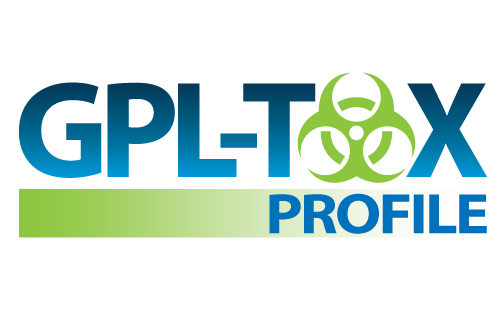The Great Plains Laboratory, Inc GPL-TOX Testing Kit
$377.00
GPL-TOX Profile (Toxic Non-Metal Chemicals)
GENERAL
Every day, we are exposed to hundreds of toxic chemicals through products like pharmaceuticals, pesticides, packaged foods, household products, and environmental pollution. As we have become more exposed to chemical-laden products and to toxic chemicals in food, air, and water, we have been confronted with an accelerating rate of chronic illnesses like cancer, heart disease, chronic fatigue syndrome, chemical sensitivity, autism spectrum disorders, ADD/AD(H)D, autoimmune disorders, Parkinson’s disease, and Alzheimer’s disease.
Because exposure to environmental pollutants has been linked to many chronic diseases, The Great Plains Laboratory has created GPL-TOX, a toxic non-metal chemical profile that screens for the presence of 173 different toxic chemicals including organophosphate pesticides, phthalates, benzene, xylene, vinyl chloride, pyrethroid insecticides, acrylamide, perchlorate, diphenyl phosphate, ethylene oxide, acrylonitrile, and more. This profile also includes Tiglylglycine (TG), a marker for mitochondrial disorders resulting from mutations of mitochondrial DNA. These mutations can be caused by exposure to toxic chemicals, infections, inflammation, and nutritional deficiencies.
ADVANTAGES OF THE GPL-TOX PROFILE
-
GPL-TOX screens for 173 different environmental pollutants using 18 different metabolites, all from a single urine sample.
-
GPL-TOX uses the power of advanced mass spectrometry (MS/MS), which is necessary to detect lower levels of certain genetic, mitochondrial, and toxic chemical markers that conventional mass spectrometry often misses.
-
GPL-TOX also includes Tiglylglycine, a marker for mitochondrial damage, which is often seen in chronic toxic chemical exposure.
-
GPL-TOX pairs perfectly with our Organic Acids Test (OAT) and our Glyphosate Test in the Enviro-TOX Panel. This panel offers you comprehensive testing to assess exposure to common environmental toxins and the damage that can be caused by this exposure, all at a great value, and all from one urine sample.
-
William Shaw, Ph.D., Director of The Great Plains Laboratory is board-certified in both clinical chemistry and toxicology by the American Board of Clinical Chemistry.
GPL-TOX IS RECOMMENDED FOR THE FOLLOWING DISORDERS:
-
Alzheimer’s Disease
-
Amyotrophic Lacteroclerosis (ALS)
-
Anorexia Nervosa
-
Anxiety Disorder
-
Apraxia
-
Arthritis
-
Asthma
-
Attention deficit (ADD)
-
Attention deficit with hyperactivity (ADHD)
-
Autism
-
Autoimmune disorders
-
Bipolar disorder
-
Cancer
-
Cerebral palsy
-
Chronic fatigue syndrome
-
Crohn’s disease
-
Depression
-
Developmental disorder
-
Down Syndrome
-
Epilepsy
-
Failure to thrive
-
Fibromyalgia
-
Genetic diseases
-
Irritable bowel syndrome
-
Learning disability
-
Mitochondria disorder
-
Multiple sclerosis
-
Obsessive compulsive disorder (OCD)
-
Occupational exposures
-
Parkinson’s disease
-
Peripheral neuropathy
-
Schizophrenia
-
Seizure disorders
-
Systemic lupus erythematosus
-
Tic disorders
-
Tourette syndrome
-
Ulcerative colitis
MITOCHONDRIAL DISORDERS
The GPL-TOX profile tests for Tiglylglycine (TG), one of the most specific markers for mitochondrial disorders resulting from mutations of mitochondrial DNA. These mutations can result from exposure to toxic chemicals, infections, inflammation, and nutritional deficiencies. Mitochondria are important in all cells in the body, but are especially important to organs that utilize large amounts of energy, such as the muscles, heart, and brain. The mitochondria also have several other important functions in the cell, including steroid synthesis, calcium regulation, free radical production, and the induction of apoptosis or programmed cell death, all of which are involved in the pathogenesis of numerous disorders. The marker used in the GPL-TOX profile indicates mitochondrial dysfunction by monitoring a metabolite that is elevated in mitochondrial deficiency of cofactors such as NAD+, flavin-containing coenzymes, and Coenzyme Q10. Disorders associated with mitochondrial dysfunction include autism, Parkinson’s disease, and cancer.
Turnaround Time
3-4 weeks
***Please note this does not include the interpretation of your results. You will need to make an appointment with one of our practitioners to discuss your results.
Return Policies
• Return policy for a refund is 90 days from the date of purchase.
• The kit must be returned to Dr Wellness before any refunds can be issued.
• Shipping fees are non-refundable.
• There is a $50 restocking fee.
• Credit card refunds can take up to 30 days to be processed.
Out of stock

